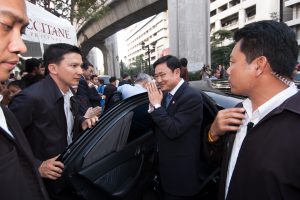Thailand’s controversial former Prime Minister Thaksin Shinawatra has hailed the remarkable victory of the progressive Move Forward Party (MFP) at this week’s election, praising its canny use of social media to perform an end-run around the country’s more established parties – including his own Pheu Thai Party (PTP).
In a two-hour discussion live-streamed yesterday on his Facebook page, the fugitive former leader, who was overthrown in a coup in 2006 and has been living in exile in Dubai since 2008, described the MFP and its leader, 42-year-old businessman Pita Limjaroenrat, as the “disruptors” of Thai politics.
The MFP, the successor to the Future Forward Party that came in third in the 2019 general election, is expected to gain 151 of the 500 seats in the House of Representatives. Pheu Thai came in second with a projected 141. Both were far ahead of the main parties of the conservative establishment.
“They used [user generated content] on TikTok because the youngsters use TikTok. It’s getting votes and canvassers organically and you don’t use a lot of resources,” Thaksin said, according to a report by Channel News Asia. “Pheu Thai got hammered because we did not disrupt ourselves enough. Move Forward’s trend overcame Pheu Thai and the other parties that had money.”
Prior to the May 14 election, Thaksin, like many independent observers, had good reason to expect that the Pheu Thai Party, which was led to the election by his 36-year-old daughter Paetongtarn Shinawatra and over which he maintains a strong influence, would top the vote. Before Sunday’s vote, parties led by or associated with Thaksin had won every election since 2001. Most were subverted in one way or another by the conservative political establishment, by military coups (in 2006 and 2014), and by politically motivated court rulings.
Thaksin has good reason to be disappointed in Pheu Thai’s ceding of the anti-military mantle to the more flexible and dynamic MFP, which ran a lean, principled campaign focused on a number of clear goals. These included ending military conscription, breaking up powerful monopolies, and reforming the lese-majeste law, which criminalizes criticism of the king and the royal family and has been used to silence critics of the ruling dispensation.
In fact, the MFP’s gains to some extent came at the PTP’s expense. The MFP shot up in pre-election polls right around the time that rumors surfaced that Pheu Thai was prepared to form a coalition government with the military-backed ruling Palang Pracharath Party (PPRP). While party leaders hastily walked back the reports – Paetongtarn said last month that Pheu Thai would not ally with any “coup makers” – the rumors only underscored the MFP’s principled goal of reducing the military’s influence in Thai politics.
At the same time, the 73-year-old Thaksin would no doubt have been cheered to witness the rout of the former generals who have governed Thailand since the coup that overthrew his sister Yingluck Shinawatra in 2014. “For the two uncles, it should be enough is enough,” he said, in an apparent reference to Prime Minister Prayut Chan-o-cha, who headed the 2014 coup, and Prawit Wongsuwan, the current leader of the PPRP, who was then his deputy. “Hanging up your gloves has dignity,” he said. “It’s a wake-up call for the army. Using excessive power is something Thai society rejects.”
Thaksin has pledged to return to Thailand in July, come what may – he faces a 17-year prison sentence for corruption – though past promises have not eventuated. It is believed that Pheu Thai’s motivation for forming a possible coalition with pro-military parties was to create a pardon that would pave the way for Thaksin’s return. When asked during yesterday’s livestream about a possible return, the former leader repeated his promise to return in July, and responded to the prospect of going to prison by saying, “whatever will be, will be.”
Despite Pheu Thai’s relatively disappointing showing in this year’s election, Thaksin will continue to cast a long shadow over his country’s politics. The PTP is now poised to join a six-party coalition that the MFP plans to form, in a bid to end nearly a decade of rule by the military and the military-adjacent PPRP. As I wrote at length yesterday, the MFP will face considerable challenges in assembling the 376-seat majority necessary to overcome the veto of the military-appointed Senate, whose 250 members will vote with the House of Representatives to choose the next prime minister in July.
The radicalism of the MFP’s agenda, particularly its stance toward the monarchy, ensures that most (if not all) senators, as well as a number of potential coalition partners, may balk at supporting an MFP-led government. The party has also ruled out forming a coalition with the three best-performed conservative parties: PPRP, Prayut’s United Thai Nation Party, and the Bhumjaithai party.
Should the MFP fail to assemble a viable governing coalition, however, Pheu Thai could well do so in its stead. While he has set himself against the military, Thaksin is not above an accommodation with the forces who have sought to eliminate his influence over the last two decades; indeed, Thaksin’s critics have long argued that his commitment to democratic principle is little more than skin deep. Whether or not this is true, the same pragmatism that proved a liability for Pheu Thai in the general election may well be an asset in the period of horse-trading and negotiation to come.

































